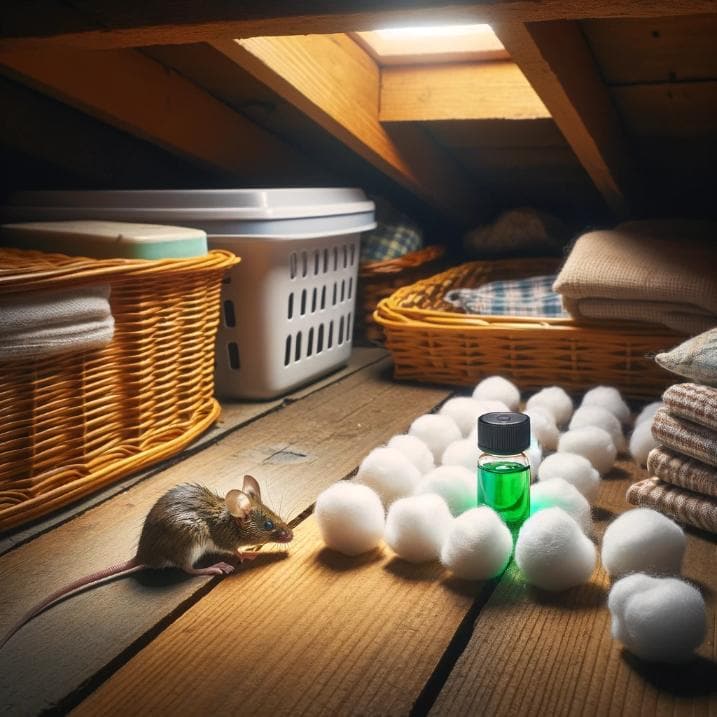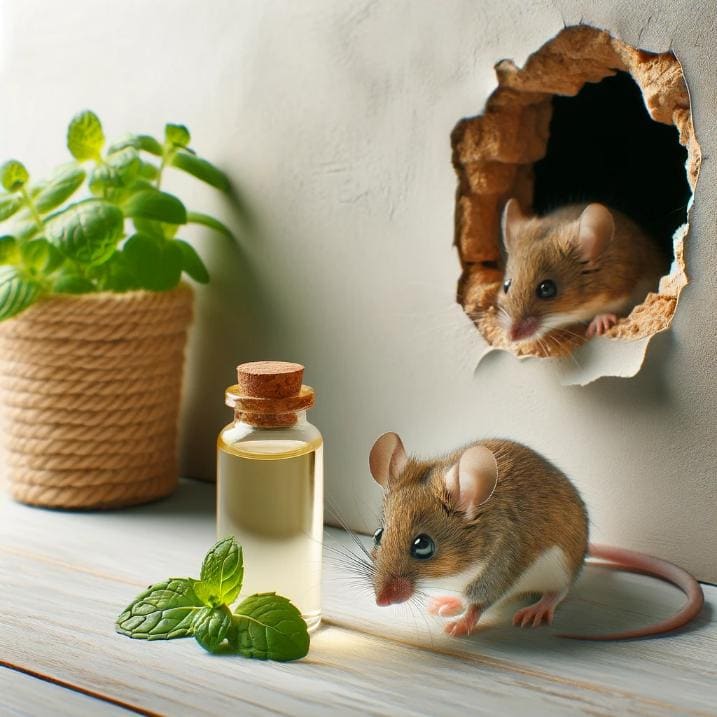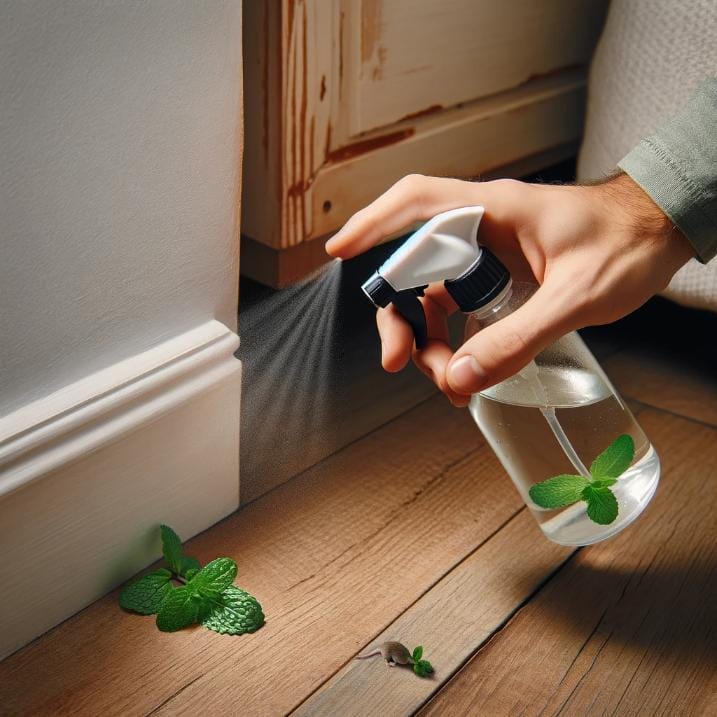Imagine a kitchen filled with the invigorating aroma of freshly crushed peppermint. To you, it’s energizing and delightful. But for a tiny houseguest lurking in the pantry, it’s an overwhelming assault on their senses.
The menthol in peppermint oil irritates their respiratory system, triggering coughing and sneezing. It also disrupts their communication and navigation, making your home a confusing maze.
Discover how to strategically use peppermint oil to repel mice in Chapter 2. Get ready to unleash the power of this natural rodent repellent!
Key Takeaways
- Peppermint oil’s scent is unpleasant and irritating to mice due to its menthol content.
- Using peppermint oil strategically can help repel mice from your home.
- DIY peppermint oil sprays, cotton ball commandos, sachets, and diffusers are effective methods of deploying peppermint oil.
- Combining peppermint oil with other strategies like traps, sealing entry points, and proper food storage enhances its effectiveness.
- Peppermint oil has limitations and may require regular reapplication for long-term effectiveness.
- Safety precautions should be taken when using peppermint oil, including diluting it and keeping it away from pets and children.
- Choose organic and sustainably sourced peppermint oil for ethical and environmentally friendly pest control.
Why Mice Dislike Peppermint: Decoding the Unpleasant Scent

Imagine entering a kitchen engulfed by the sharp, invigorating aroma of freshly crushed peppermint. To you, it’s a refreshing burst of energy, a delightful tingle in your senses. But for a tiny houseguest lurking in the pantry, it’s a sensory assault, a chemical alarm bell blaring “DANGER!” This explains why peppermint oil has become a popular weapon in the natural rodent-repellent arsenal.
Mice, blessed with a hypersensitive olfactory system, perceive the world through smells far more potent than ours. While we savor the cool minty sweetness, they encounter a concentrated blast of menthol, the active ingredient in peppermint. This menthol irritates their respiratory system, triggering coughing, sneezing, and a desperate desire to flee the pungent onslaught. It’s akin to us walking into a room choked with pepper spray – not exactly a relaxing staycation.
Beyond the immediate irritation, the strong scent disrupts their communication and navigation. Mice rely heavily on pheromone trails to locate food and mates. Peppermint oil disrupts these crucial chemical pathways, effectively throwing them off course and making your home a confusing, unpleasant maze.
Now, you might be tempted to declare peppermint oil the ultimate rodent-be-gone potion. But hold your horses, intrepid pest warriors! While its repelling power is undeniable, it’s crucial to understand its limitations before declaring victory. This is where Chapter 2 comes in, where we’ll delve deeper into unleashing the strategic power of peppermint oil – stay tuned!
Unleashing the Repellent Power: Applying Peppermint Oil Strategically
With the pungent punch of peppermint decoded, it’s time to turn theory into action. This chapter delves into the practicalities of harnessing peppermint oil’s repulsive powers, transforming it from a potent olfactory bomb into a targeted weapon against those furry invaders.
2.1 DIY Peppermint Oil Sprays: Crafting Your Weapon against Mice
Imagine a refreshing mist – not for your face, but for your foe. A homemade peppermint oil spray is your frontline defense, a DIY deterrent crafted with simple ingredients. Here’s the recipe for concocting your olfactory artillery:
- Ingredients:
- 10 drops of pure peppermint essential oil
- 1 cup of water
- 1 tablespoon of white vinegar (optional)
- Spray bottle
- Instructions:
- Combine the peppermint oil and water in your trusty spray bottle.
- Add the vinegar if you desire an extra punch of scent and cleaning power.
- Shake well to ensure thorough mixing, and voila! Your minty mouse mayhem-maker is ready for deployment.
2.2 Beyond the Spray: Alternative Methods for Peppermint Power
Sprays are far from the only way to unleash the olfactory offensive. For a sustained scent release, consider these strategic deployments:
- Cotton Ball Commandos: Soak cotton balls in your homemade spray and strategically place them near suspected entry points, nesting areas, and other rodent hotspots. Replace them every few days to maintain the minty menace.
- Sachet Secrets: Craft fabric pouches filled with dried peppermint leaves or cotton balls soaked in diluted oil. Hang or place them in drawers, cabinets, and crawl spaces for a long-lasting scent diffusion.
- Diffuser Deluge: Essential oil diffusers can be your silent allies, filling the air with a subtle but persistent peppermint presence. Opt for diffusers that allow for intervallic operation to maximize oil efficiency.
- Crafted using all-natural peppermint oil, this product is safe to use around pets and children. However, rodents hate it! Proudly made in America
- Safely spray Rodent Sheriff in your home or garden, as it naturally deters unwanted pests with its captivating peppermint scent,
- This handcrafted solution has been proven effective in repelling a variety of pests, including mice, raccoons, roaches, and more
- Each package includes two 8-ounce bottles of this powerful, all-natural peppermint spray, providing you with enough solution for approximately 2,000 sprays
- Protect your spaces prone to pests by utilizing this product. It can be used in garages, basements, kitchens, attics, sheds, trash cans, and numerous other areas
2.3 Boosting Effectiveness: Combining Peppermint Oil with Other Strategies
Peppermint oil, while potent, thrives in a multi-pronged approach. Here are some allies to bolster your rodent-repelling arsenal:
- Traditional Traps and Baits: While peppermint deters, traps and baits eliminate. Use them in conjunction with your peppermint tactics for a one-two punch.
- Sealing the Fort: Plug those entry points! Cracks, gaps, and holes are open invitations for furry freeloaders. Seal them up with caulk, steel wool, or other pest-proof materials.
- Food Deprivation: Remove the buffet! Store food properly in sealed containers, clean up crumbs, and don’t leave pet food readily available.
- Professional Help for Heavy Infestations: When the minty mayhem isn’t enough, professional pest control might be necessary. Don’t hesitate to call in the big guns for severe infestations.
Remember, consistency is key. Reapply sprays, replace cotton balls, and maintain other methods regularly to keep the intense pressure on. With persistence and a multi-layered approach, your home can become a fortress of freshness, unwelcome to any whiskered intruder.
Limitations and Considerations: Using Peppermint Oil Responsibly

While the minty fresh scent of peppermint may evoke images of cozy holiday cheer, for our whiskered freeloaders, it’s a pungent punch to the senses. But even this potent weapon has its limitations, and wielding it responsibly requires acknowledging its boundaries.
3.1 The Case for Cautious Optimism: Understanding Peppermint Oil’s Limits
Peppermint oil, while a valuable tool, is not a magic wand. It acts as a deterrent, not an exterminator. While the initial blast of menthol may send mice scurrying, it’s not a guaranteed eviction notice. Over time, they may adapt to the scent, rendering its repellency less effective. Remember, persistence is key – regular reapplication and strategic placement are crucial for maintaining the minty mayhem.
Furthermore, peppermint oil’s effectiveness diminishes in open spaces. Large rooms or areas with poor ventilation allow the scent to dissipate quickly, limiting its reach. Professional pest control might be the more potent remedy in situations with severe infestations, where sheer numbers overwhelm the minty onslaught.
3.2 Safety First: Essential Precautions for Using Peppermint Oil
Nature’s gifts, while powerful, can have their prickly sides. Undiluted peppermint oil can irritate skin and eyes, so caution is paramount. Always dilute it in water before spraying or applying, and wear gloves for added protection. Keep it away from children and pets, and store it securely out of their reach. If you have any respiratory sensitivities, proceed with extra care and consult a doctor before using peppermint oil extensively.
3.3 Ethical and Environmental Concerns: Choosing Cruelty-Free Options
Combating unwelcome guests shouldn’t come at the cost of harming others. When choosing your weapon of choice, opt for organic and sustainably sourced peppermint oil. This not only minimizes environmental impact but also ensures safe cultivation practices. Remember, a humane approach to pest control is always preferable. Consider using live traps that allow for relocation rather than extermination, and dispose of captured mice responsibly and ethically.
By acknowledging these limitations and exercising caution, you can transform peppermint oil from a well-intentioned but potentially harmful weapon into a responsible and effective tool in your rodent-repelling arsenal. Remember, knowledge is power, and using it wisely paves the way for a harmonious coexistence with our (albeit unwelcome) housemates.
FAQ: Demystifying Common Questions about Peppermint Oil and Mice

The battle against furry invaders can be fraught with confusion and curiosity. So, let’s untangle the web of questions swirling around peppermint oil and its effectiveness against our whiskered foes.
Q: Do ultrasonic mouse repellents work?
While the high-pitched sounds emitted by these devices may seem like sonic torture for tiny ears, scientific evidence remains inconclusive. Some studies suggest limited effectiveness, while others show little to no impact. If you choose this route, research specific brands and consider them supplemental, not a standalone solution.
Q: Can I simply leave out Irish Spring soap to repel mice?
Mice indeed dislike the pungent aroma of Irish Spring soap, but its effectiveness wanes quickly. The scent dissipates easily, requiring frequent replacements, and its long-term impact remains questionable. Combining it with other methods might offer a temporary boost, but consider it more of a folklore remedy than a guaranteed solution.
Q: Are homemade mouse repellents safe for dogs and cats?
Essential oils like peppermint can be harmful to our furry companions if ingested. Always keep them diluted and stored securely out of reach. Consult your veterinarian before using any type of repellent around pets, as even seemingly safe ingredients can cause unexpected reactions.
Q: Is there a single ‘most effective’ mouse repellent?
The answer, unfortunately, is a resounding “no.” The effectiveness of any method depends on the specific situation, the severity of the infestation, and the adaptability of the mice themselves. A multi-pronged approach, combining peppermint oil with traditional traps, sealing entry points, and eliminating food sources, will yield the best results.
Q: Can I find mouse repellents on Amazon or Walmart?
Yes, both online and brick-and-mortar retailers offer a variety of mouse repellents, from commercial sprays and ultrasonic devices to natural options like peppermint oil and dried herbs. Research different brands, read reviews, and prioritize safety and ethical considerations when choosing.
Q: Where can I find more information about using peppermint oil safely and effectively?
Reliable sources like university extension websites, government pest control agencies, and reputable pest control companies offer valuable information on responsibly using peppermint oil and other methods. Remember, knowledge is power when it comes to combating unwanted guests!
By demystifying these common questions, we can equip ourselves with the knowledge and understanding needed to navigate the world of rodent control. Remember, curiosity and informed action can go a long way in reclaiming your home from the clutches of even the most determined pint-sized invaders.
Conclusion: Peppermint Oil in Your Rodent Control Arsenal

The battle lines have been drawn, the scent of menthol a potent weapon in your arsenal. After delving into the world of peppermint oil and its efficacy against your whiskered adversaries, a clear picture emerges: while not a magic bullet, this natural foe-repellent holds its own in the pest control arena.
The Verdict: A Valuable Tool in the Right Hands
Peppermint oil’s claim to fame lies in its potent repellency. Its sharp, menthol-infused aroma is a sensory assault on mice, driving them from their cozy haunts and discouraging unwelcome forays into your domain. It’s a cost-effective, readily available option, far gentler than harsh chemicals, and boasting a pleasant (to human noses) side effect.
However, let’s be clear: peppermint oil is a deterrent, not an exterminator. While it may send those furry freeloaders packing from their favorite corner, it won’t magically erase their entire existence. Persistence is key – reapplication is crucial as the minty magic fades, and vigilance remains your watchword.
Beyond the Spray: A Multi-Pronged Approach
Remember, peppermint oil is most effective when woven into a tapestry of rodent control strategies. Sealing entry points to cut off access, eliminating food sources that lure them in, and employing traditional traps for persistent offenders should all be part of your well-oiled plan. Think of peppermint oil as the aromatic alarm system, the first line of defense in your multi-pronged attack.
Safety First, Ethics Always
Just like any weapon, peppermint oil demands responsible use. Keep it safely diluted and stored away from curious paws and tiny hands. Respect your furry companions and choose pet-safe alternatives. Embrace organic, sustainably sourced oil, minimizing your environmental footprint while maximizing your minty might.
More Than Mice: A Natural Ally in Your Home
The battle against unwelcome guests extends beyond the realm of mice. Spiders, ants, and other creepy crawlies can also find their enthusiasm dampened by a well-placed peppermint sachet. Its refreshing scent freshens the air while keeping unwanted visitors at bay, making it a natural multitasker in your home’s wellness arsenal.
The Final Call: Sharing, Learning, and Winning the War
The fight against unwanted roommates is a communal effort. Share your experiences, ask questions, and learn from others. This shared knowledge is our greatest weapon, empowering us to reclaim our homes, one minty drop at a time. So, let’s keep the conversation flowing, the peppermint oil diffusing, and the unwelcome guests firmly outside where they belong.
Peppermint oil may not be the ultimate solution, but in the right hands, it’s a powerful ally in the fight for a pest-free, fresh-smelling home. So, embrace its minty might, wield it wisely, and let the battle against furry invaders commence!
- Naturally Safe for People and Pets When Used as Directed – Smells Good Too!
- Extra-Concentrated Strength for Long-Lasting Protection
- Locally-Sourced, High-Grade Peppermint from the Pacific Northwest
- Active Ingredient: Pure Origin Peppermint Essential Oil
- Drives Rodents Out and Keeps Them Away – Humane and Effective
References
- Does Peppermint Oil Control Mice? Here’s How to Use It
- Mighty Mint 16oz Peppermint Oil Rodent Repellent Spray
- I Used Peppermint Oil to Get Rid of Mice – The Kitchn
- Anyone use peppermint oil to deal with critters?
- Can peppermint oil keep mice away?
- The truth about 3 natural mice repellents
- Does Peppermint Oil Repel Mice? How to Use It

Welcome to micegoneguide.com, your go-to resource for eliminating rats and mice. Say goodbye to rodent infestations with our expert tips and strategies. Visit us now and reclaim your space!


